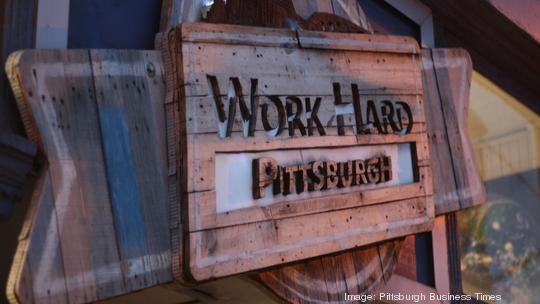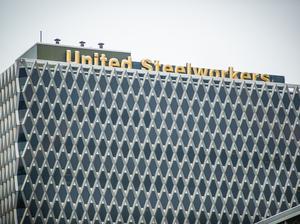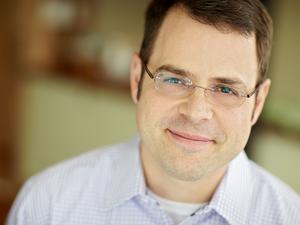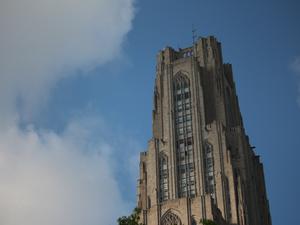
The Work Hard Pittsburgh entrepreneurial ecosystem, which includes the Work Hard Pittsburgh Cooperative group, freelance organization WH Digital and several commercial real estate holding companies, will be 'winding down' over the coming months as part of an effort to pay back outstanding debt obligations, according to a letter announcing the planned shuttering of the larger Work Hard organization written by Work Hard's Executive Director and Founder Josh Lucas.
"After taking a bit of a thrashing from a global pandemic, the core team has decided it is time to end this experiment and begin the painful process of liquidating assets including our longtime home, 744 E. Warrington Ave.," the letter stated. "These tough decisions have not been arrived at quickly or lightly. In May of 2021, we communicated to our membership the pending financial crisis, and despite our best efforts, bridge financing was not secured. Moving forward, the remaining resources will be used to settle outstanding debts, pay dividends to our member-owners as possible and appropriate, and support Academy Pittsburgh's reorganization."
Academy Pittsburgh, an organization affiliated with the Work Hard ecosystem that provides coding boot camps, will likely continue operations, Lucas said in the letter.
First launched in 2013, the Work Hard ecosystem of organizations provided co-working spaces and other resources to entrepreneurs in the Pittsburgh tech community with an emphasis on increasing equitable access for people who were interested in being a part of the local tech and tech-adjacent economy.
With the Work Hard Pittsburgh Cooperative, dues-paying members contributed funds and acquired equity in the organization itself. Through that collective ownership model, Work Hard claimed it avoided the "high-risk, high-reward investment model used by many business incubators" and, as a result, launched "impact-driven training programs to provide entrepreneurs a path to sustainability and fulfillment," according to its website.
That all now will come to an end over the next few months as Lucas said the organization's executive committee, which managed the day-to-day operations of the co-op, made the decision to begin reducing the co-op's operations as a way to pay back its debts. Members collectively were not consulted for that decision, and Lucas said he understood that the executive committee's decision to do so was contentious.
"I understand this is controversial, but the co-op has as an executive committee and the reality is when there's no money and no participation from the membership, then the executive committee has to act in a fiduciary role that is going to be responsible to our debt holders," Lucas said. "It's not really a matter of a vote from the membership because the financial reality of not having money triggers a whole set of circumstances that are unfortunately unpleasant and painful for folks to watch happen, but that's just the reality of the math."
Since its founding, Work Hard claimed its efforts resulted in workers earning $30 million in salaried pay, $15 million of which it said went to those in underrepresented groups in the tech economy following training received at Academy Pittsburgh. For contractors, Work Hard said its efforts resulted in $10 million in wages for freelance workers. It also claimed to have provided $3 million worth of pro bono support for local nonprofits via the efforts made by those in the co-op.
But financial hardships caused by the pandemic ultimately forced the organization to begin looking into ways to close following the need to pay off its debt, which includes funds owed to the Urban Redevelopment Authority of Pittsburgh, Local Initiatives Support Corp. and the Pittsburgh-based Birmingham Foundation.
"We did a lot of good between then and now," Lucas said. "Covid, like everything, changed our market opportunities and it's just to the point now where we're just out of money. …We're very sympathetic that folks are disappointed that it's ending the way it's ending and we understand that it's not ideal and not what people had hoped for this ecosystem, … but it's my obligation as president, the executive committee's obligation of being a good steward of those liabilities against those assets to make sure that our institutional partners and our investors all get a fair shake in the wind-down."
Lucas said it's too soon to tell in terms of more specifics as to what the winding down means for Work Hard's members, which he said he can count on one hand in terms of those who are still using Work Hard's co-working space in the Allentown neighborhood after the pandemic forced many of the individuals and groups that were using the facility to dissolve over the past two years. After liquidating all of its assets — which Lucas said could take a few years for some entities — and paying off outstanding debts, member-owners will receive dividends for their share in the co-op should any funds remain.
"Covid really did destroy the community that was actively engaged inside that physical space, which is part of the reason why this wind-down is happening," Lucas said. "There's just not the same critical mass of interest, and there are no resources to kind of rebuild that community in a way that makes sense."
But for some members, the news of the decision to wind down Work Hard came off as a personal loss and as a loss for the region's startup community.
That's the case for Buzzy Torek, the owner and producer of multiple podcasts under the name Epicast TV. A member of the Work Hard co-op, he said that, in many ways, the organization served an important role in the development of his career.
"I had a place to learn, I had a place to record and for example, when I started this thing, I didn't know what an invoice was and how to do that, how to communicate with clients, and those were all skills that I learned naturally from being in a cooperative environment," Torek said. "I owe a lot of what I know about business to not the co-op, but to the people in the co-op. … It was a meeting space and a creative space, and it wasn't fancy. It was very guerrilla and do-it-yourself."









